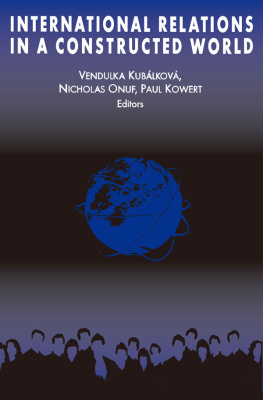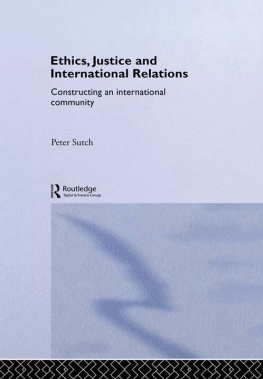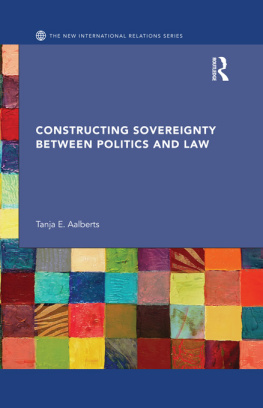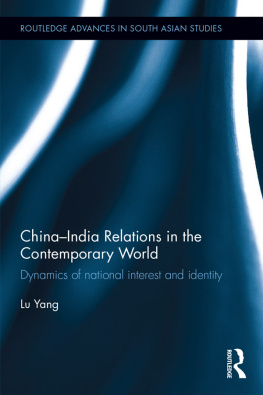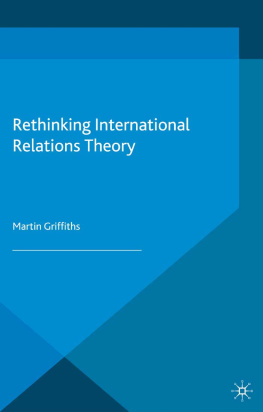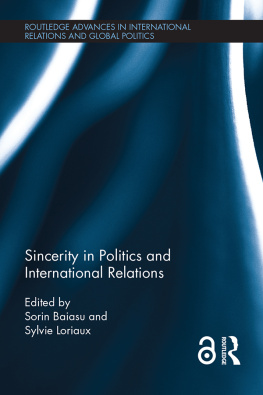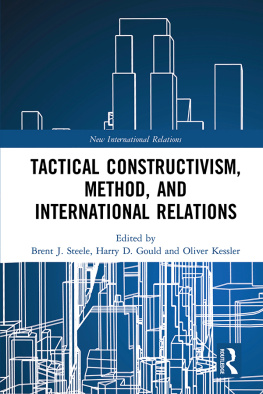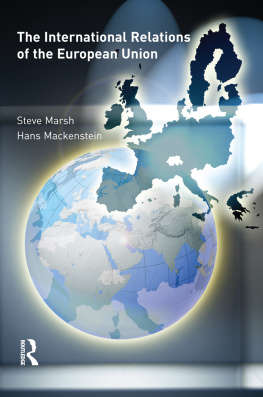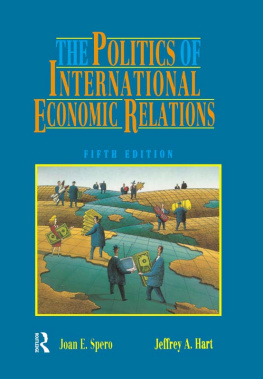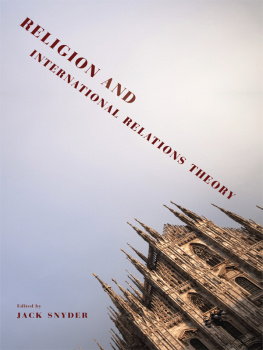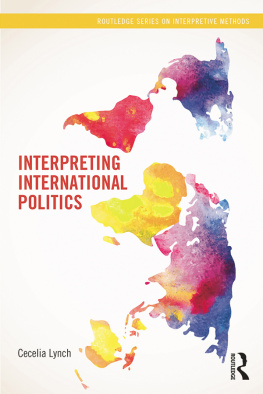INTERNATIONAL RELATIONS
IN A CONSTRUCTED WORLD
First published 1998 by M.E. Sharpe
Published 2015 by Routledge
2 Park Square, Milton Park, Abingdon, Oxon OX14 4RN
711 Third Avenue, New York, NY 10017, USA
Routledge is an imprint of the Taylor & Francis Group, an informa business
Copyright 1998 Taylor & Francis. All rights reserved.
No part of this book may be reprinted or reproduced or utilised in any form or by any electronic, mechanical, or other means, now known or hereafter invented, including photocopying and recording, or in any information storage or retrieval system, without permission in writing from the publishers.
Notices
No responsibility is assumed by the publisher for any injury and/or damage to persons or property as a matter of products liability, negligence or otherwise, or from any use of operation of any methods, products, instructions or ideas contained in the material herein.
Practitioners and researchers must always rely on their own experience and knowledge in evaluating and using any information, methods, compounds, or experiments described herein. In using such information or methods they should be mindful of their own safety and the safety of others, including parties for whom they have a professional responsibility.
Product or corporate names may be trademarks or registered trademarks, and are used only for identification and explanation without intent to infringe.
Library of Congress Cataloging-in-Publication Data
International relations in a constructed world /
edited by Vendulka Kublkov, Nicholas Onuf, and Paul Kowert.
p. cm.
Includes bibliographical references and index.
ISBN 0-7656-0297-0 (cloth : alk. paper).
ISBN 0-7656-0298-9 (pbk. : alk. paper)
1. International relations. 2. Constructivism (philosophy). I. Kublkov, V. II. Onuf, Nicholas Greenwood. III. Kowert, Paul, 1964
JZ1305.1575 1998
327dc21 97-46968
CIP
ISBN 13: 9780765602985 (pbk)
ISBN 13: 9780765602978 (hbk)
Contents
Vendulka Kublkov, Nicholas Onuf, and Paul Kowert
Vendulka Kublkov
Nicholas Onuf
Harry D. Gould
PART III. INTERNATIONAL RELATIONS UNDER
CONSTRUCTION
Paul Kowert
Elisabeth Prgl
Craig Simon
Henry L. Hamman
Vendulka Kublkov
Harry D. Gould received an M.A. in International Studies from Florida International University. He is pursuing doctoral studies in the Department of Political Science, Johns Hopkins University.
Henry L. Hamman received his Ph.D. from the University of Miami in International Relations. He is president of Sociocybernetics Inc., a systems research company based in Miami. He is the author and editor of a number of books on international relations.
Paul Kowert is an assistant professor in the Department of International Relations at Florida International University. He is the author of recent studies on foreign policy decision making and social identity in international politics.
Vendulka Kublkov is a professor of international studies in the School of International Studies at the University of Miami and the author, among other works, with A.A. Cruickshank, of Marxism and International Relations.
Nicholas Onuf is a professor in the Department of International Relations at Florida International University. His most recent book is The Republican Legacy in International Thought.
Elisabeth Prgl is an assistant professor in the Department of International Relations at Florida International University and the author of recent studies in feminist international relations theory.
Craig Simon is a database application specialist. He is a Ph.D. candidate at the School of International Studies at the University of Miami, and is writing a dissertation Bandwidth Rules: Standards and Structure in Global Internet Governance.
Prefaces are really postscripts. Authors write them at the very end, grateful that their labors are really over. They acknowledge the assistance of institutions, colleagues, and relatives, and explain the circumstances under which the book was written. It is also the last opportunity to reprise some of the books themes.
It is in the nature of this particular project that we have many afterthoughts. We did not want to write yet another book on the parlous state of theory in the field of International Relations (IR). The dominant approaches and theories in any field of study are seldom without critics. The third debate in IR has been especially ferocious, as anyone who takes the trouble to understand its technically difficult language can confirm. Some critics have indicted mainstream theorists for fraud, finding them guilty by association with the Enlightenment project. On the evidence of great changes in the world during the past decade, other critics have been content to show that the theoretical mainstream failed in its own terms.
In this book, we do not enter into the debate, except to the very limited extent required to situate ourselves. Instead, we try to do something different: to develop an alternative way of studying international relations as social relations, and in the process reconceptualize the field in relation to other fields.
The opportunity to try something different arose when Nicholas Onuf came to teach in Miami several years after he had written World of Our Making (1989). In this systematic and technically demanding book, Onuf developed a constructivist framework from a broad range of theoretical materials as a way beyond what was then emerging as the third debate. Vendulka Kublkov greeted Onufs arrival across town by proposing that they convene the Miami International Relations Group as a running seminar for their colleagues and students. Kublkov soon prevailed on Onuf to present an accessible version of his constructivist framework to the Miami Group, and other participants followed suit with papers variously relevant to that framework. In 1996, several members of the Miami Group presented their papers together at the joint conference of the International Studies Association and the Japan Association of International Relations. At that time the editors began the process of forming the work of the Miami Group into a coherent volume.
Since Onuf introduced constructivism in 1989 it has generated growing interest, and many scholars have adopted the name for their approaches. There are, in fact, not one but several constructivisms in the literature. The appeal of the name should come as no surprise in a decade that has witnessed epochal political and economic rearrangements. The bipolar Cold War system and the entire Soviet bloc collapsed. The world plunged into turmoil with an unprecedented number of nations and ethnic groups demanding sovereign statehood, political subdivision, or at least redrawn frontiers. The world is abuzz with economic and diplomatic activities as new geopolitical, geoeconomic, and geostrategic changes take place. These international changes occur against the backdrop of the vast part of the planet also changing internal ways of running political, economic, and social affairs. No part of the world can avoid these changes or their consequences; the entire world is continuously under construction. The choice of the term constructivism therefore seems particularly apposite.
Mainstream IR failed to anticipate these changes: in theory, nothing much was supposed to change. Many critics saw this failure as evidence against the possibility of theory. Some critics even saw it as confirming that the world is never what it seems. Constructivism points to the limitations of mainstream thinking, but it rejects the conclusion that theory about the worldor a coherent description of the worldis impossible.
Next page
